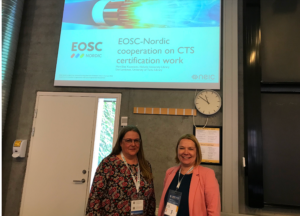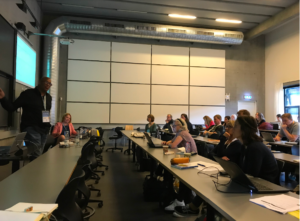Presenting our experiences representing EOSC-Nordic at the LIBER conference
The Association of European Research Libraries (LIBER) organises an annual workshop every July. Before the conference, various working groups of LIBER organise workshops. One of the recurring themes of the workshop is research data management. This time the theme of the workshop was to share experiences and lessons learned from library involvement in cooperation and projects.
How does this relate to EOSC-Nordic? Well, there are also experts for libraries working on the EOSC Nordic project. Two of us (Mari Elisa Kuusniemi, aka MEK, and Liisi Lembinen) also chair the LIBER research data management working group, which organised the workshop. Therefore, we had an excellent opportunity to share our experiences and lessons learned from the EOSC-Nordic project.
Besides our presentation, we also had short presentations about cooperation at the Swiss Federal Institute of Technology Lausanne by Miriam Braskova and Francesco Varrato, as well as expectations on a new upcoming project, Skills4EOSC, by Richard Dennis from the Royal Danish Library.
As part of the project, EOSC-Nordic supports repositories in applying for certification. A certificate helps the user to identify reliable, qualitatively maintained data repositories. Quality assessment is difficult, time-consuming, and left to the end-users to manage without a certificate. Users, as well as research funders and publishers, are now increasingly aware of the importance of certificates. Therefore, the repositories should obtain a certificate of quality for their service. The workshop highlighted many lessons we had learned while working in EOSC-Nordic to support the certification of repositories.

Image: Mari-Elisa Kuusiniemi and Liisi Lembinen. Photo by Žibutė Petrauskienė (CC BY)
Liisi’s perspective as support receiving repository developer
With the help of the EOSC-Nordic team, our repository management team became more aware of various shortcomings of our repository, which helped us improve the quality and required documentation. In addition, we now have a clearer idea of the Core Trust Seal requirements. We finally decided not to apply for the CTS certification at this moment because we understood that CTS is better for subject-specific repositories than general ones, and our most significant obstacle was detailing the requirements of designated communities. As a recommendation for CTS – more detailed and best-practice samples would be useful for other repositories applying for the certification.
MEK’s perspective as a certification support provider
MEK learned a lot about the Core Trust Seal certification of data repositories when she helped the repositories together with a vastly more experienced expert. Mari Kleemola, from Tampere University and Finnish Social Science Data Archive, knows the certificate very well and is a member of the board of Core Trust Seal. Mari knew the certification process, and MEK was familiar with the research fields of customer repositories. At first, MEK could not understand the questions on the certification form; some of them looked like Core Trust Seal was asking the same things repeatedly. However, in the end, she was able to comment and advise the repositories on writing self-assessments for applications. The application form no longer seemed to repeat the same questions. Working with a skilled specialist turned out to be an effective way to learn new skills on a reasonably demanding topic.

Image: The LIBER Conference. Photo by MEK (CC BY)
Presentations are available in the LIBER Zenodo collection: https://doi.org/10.5281/zenodo.6811417
Authors: Mari-Elisa Kuusniemi aka MEK (University of Helsinki) and Liisi Lembinen (University of Tartu)